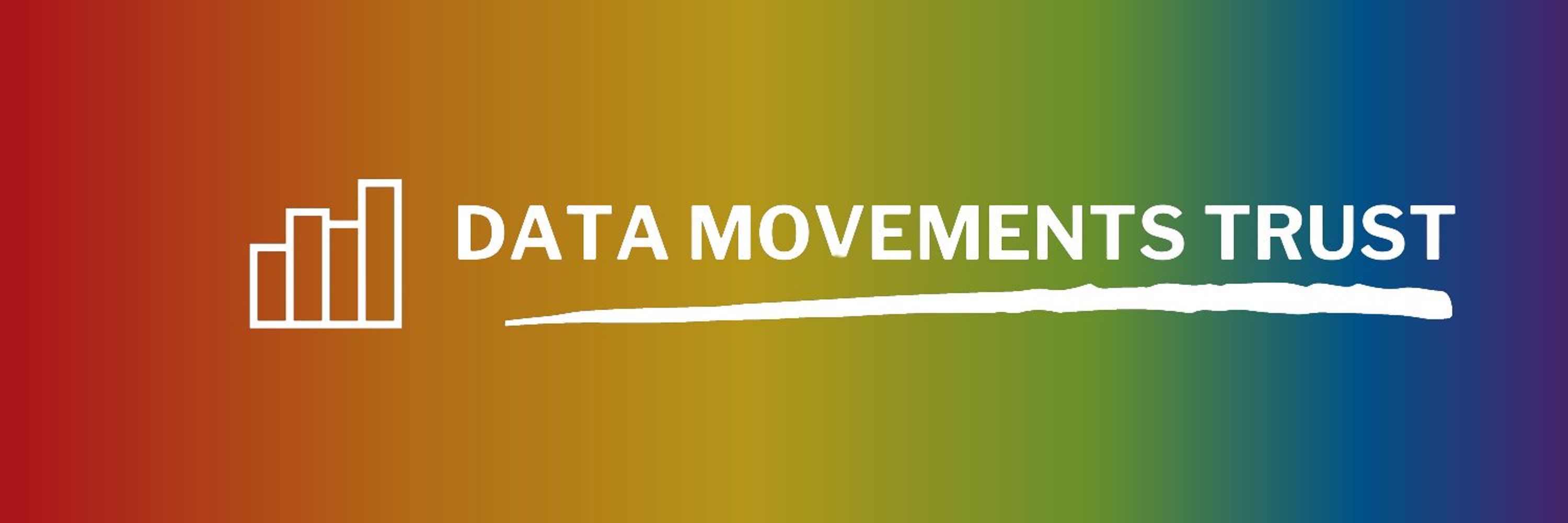
dataforprogress.org
Ryan is an expert in survey methodology with a long history in progressive and union politics — he has worked with DFP since 2019 to shape our electoral polling.

In Republican-held swing districts, a generic Democrat performs better once voters learn that their representative voted against extending ACA subsidies.
www.dataforprogress.org/blog/2025/12...

In Republican-held swing districts, a generic Democrat performs better once voters learn that their representative voted against extending ACA subsidies.
www.dataforprogress.org/blog/2025/12...
www.dataforprogress.org/blog/2025/12...

www.dataforprogress.org/blog/2025/12...
www.dataforprogress.org/blog/2025/12...

www.dataforprogress.org/blog/2025/12...
But in each case, a minority of voters actually want that speech to be restricted.

But in each case, a minority of voters actually want that speech to be restricted.
Although the vote is expected to fail, 69% of voters support extending these tax credits.
www.dataforprogress.org/datasets/pol...

Although the vote is expected to fail, 69% of voters support extending these tax credits.
www.dataforprogress.org/datasets/pol...
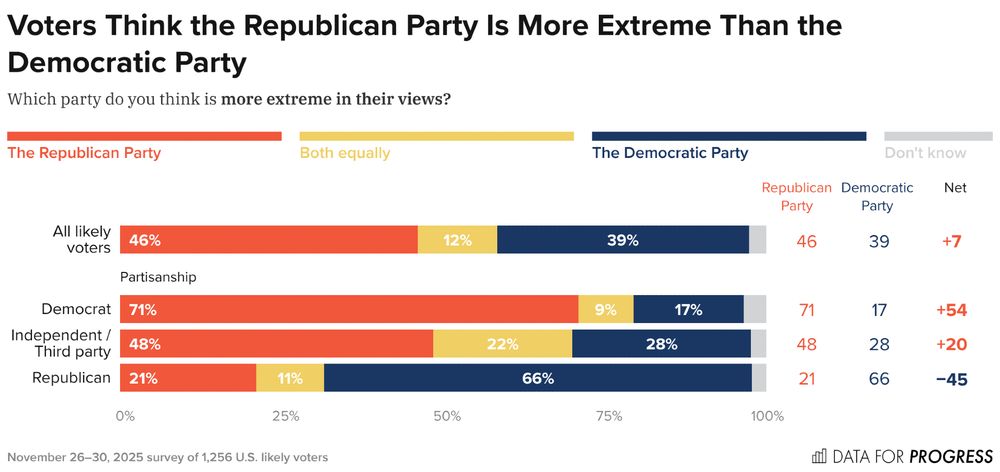
We'd be *extremely* grateful if you could support us this Giving Tuesday.
Support us today:
secure.actblue.com/donate/data-...
- Eliminate most private insurance plans
- Replace premiums with higher taxes
- Guarantee health coverage for everyone
- Eliminate most out-of-pocket costs like copays and deductibles

We'd be *extremely* grateful if you could support us this Giving Tuesday.
Support us today:
secure.actblue.com/donate/data-...
This year, the Trump administration withdrew a plan to require compensation for delays caused by the airline.
But 85% of voters think passengers should receive refunds for these delays.
www.dataforprogress.org/datasets/pol...

This year, the Trump administration withdrew a plan to require compensation for delays caused by the airline.
But 85% of voters think passengers should receive refunds for these delays.
www.dataforprogress.org/datasets/pol...
- Eliminate most private insurance plans
- Replace premiums with higher taxes
- Guarantee health coverage for everyone
- Eliminate most out-of-pocket costs like copays and deductibles

- Eliminate most private insurance plans
- Replace premiums with higher taxes
- Guarantee health coverage for everyone
- Eliminate most out-of-pocket costs like copays and deductibles
www.dataforprogress.org/datasets/pol...
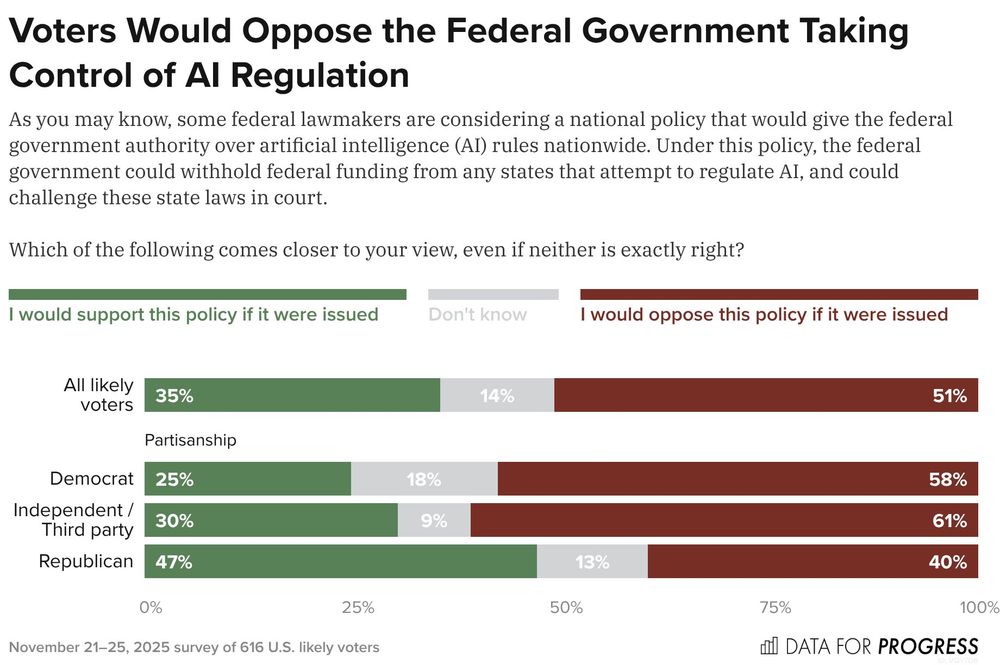
www.dataforprogress.org/datasets/pol...

Laura Fine trails in third with 10%, and all other candidates receive 6% or less of the vote.
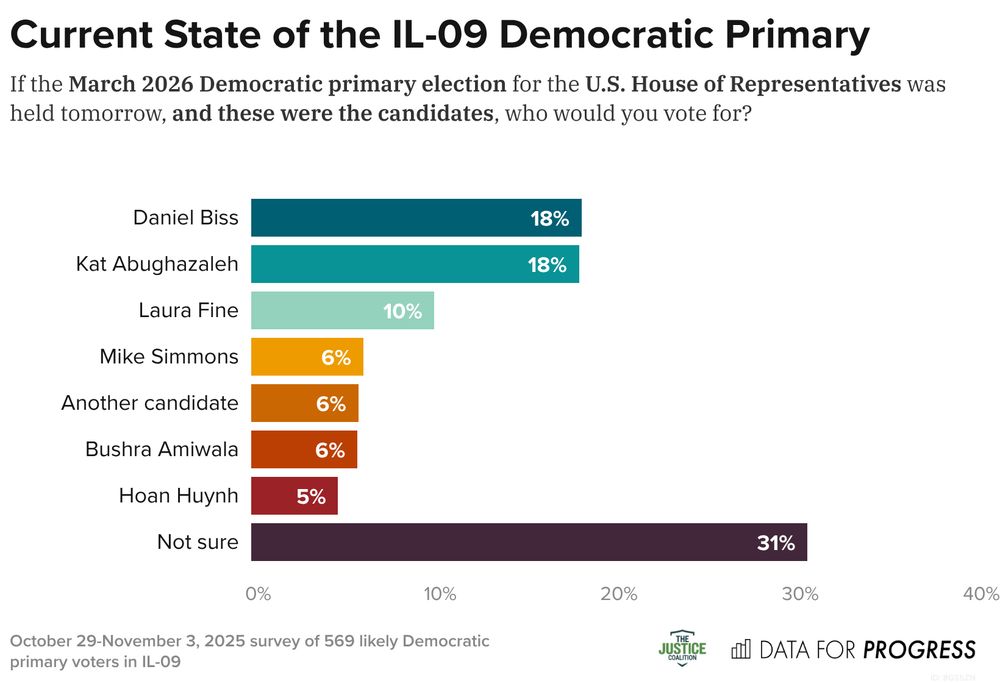
Laura Fine trails in third with 10%, and all other candidates receive 6% or less of the vote.
Democratic voters rated the party higher during the shutdown than after the last funding fight in March.
However, their ratings declined slightly once the shutdown ended.
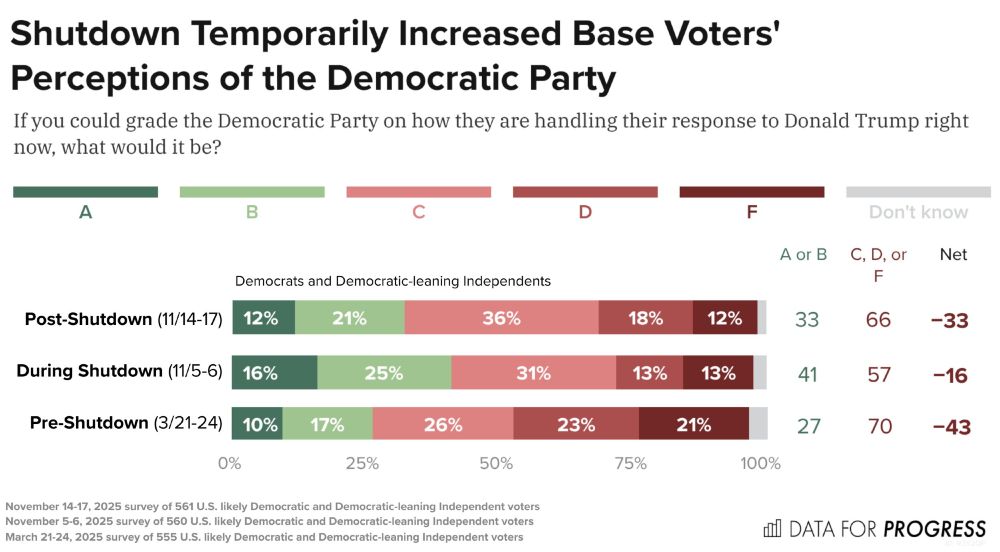
Democratic voters rated the party higher during the shutdown than after the last funding fight in March.
However, their ratings declined slightly once the shutdown ended.
www.dataforprogress.org/blog/2025/11...

www.dataforprogress.org/blog/2025/11...
Among likely Dem. primary voters, Rep. Ed Case leads against a generic opponent by 7 points, with 21% undecided.
While Case leads by 24 points against two named challengers, the race tightens if he faces only one opponent.
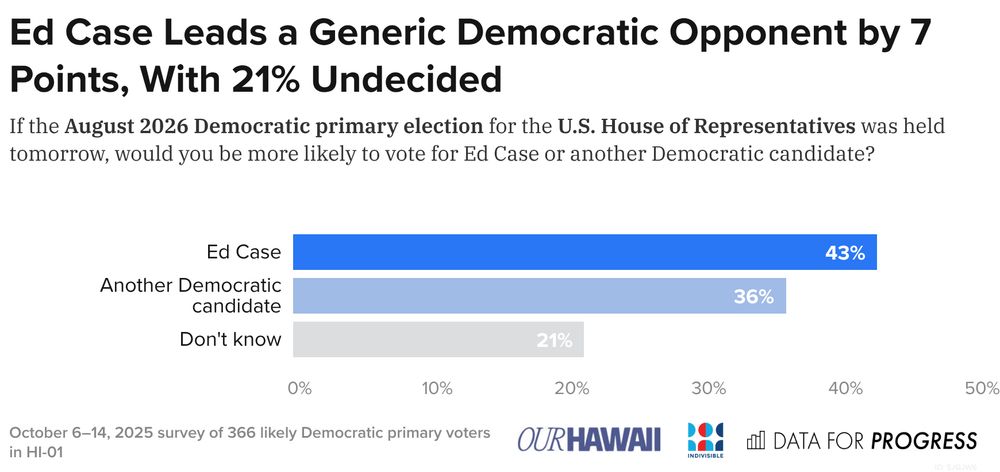
Among likely Dem. primary voters, Rep. Ed Case leads against a generic opponent by 7 points, with 21% undecided.
While Case leads by 24 points against two named challengers, the race tightens if he faces only one opponent.
www.dataforprogress.org/blog/2025/11...
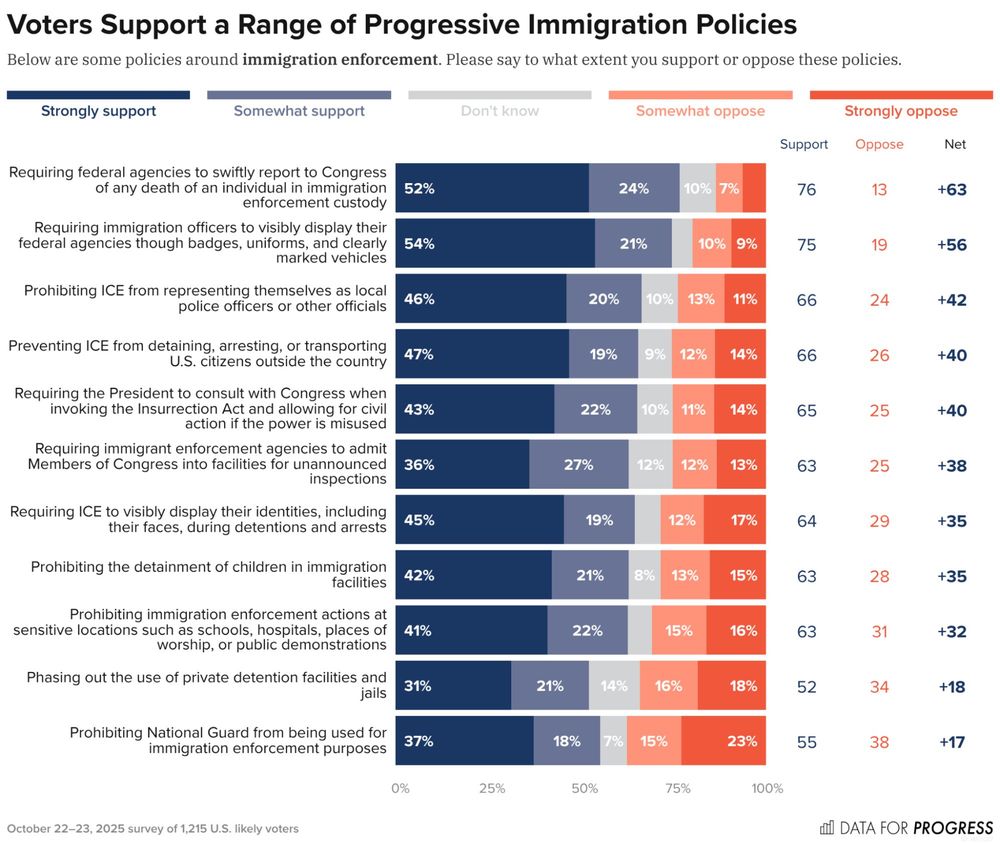
www.dataforprogress.org/blog/2025/11...
It’s not just the rent that’s too damn high — it’s everything.
The American Dream isn’t real for a lot of hardworking people; it’s been ripped away.
Democrats must make the patriotic fight to restore the American Dream the beating heart of our party.

It’s not just the rent that’s too damn high — it’s everything.
The American Dream isn’t real for a lot of hardworking people; it’s been ripped away.
Democrats must make the patriotic fight to restore the American Dream the beating heart of our party.
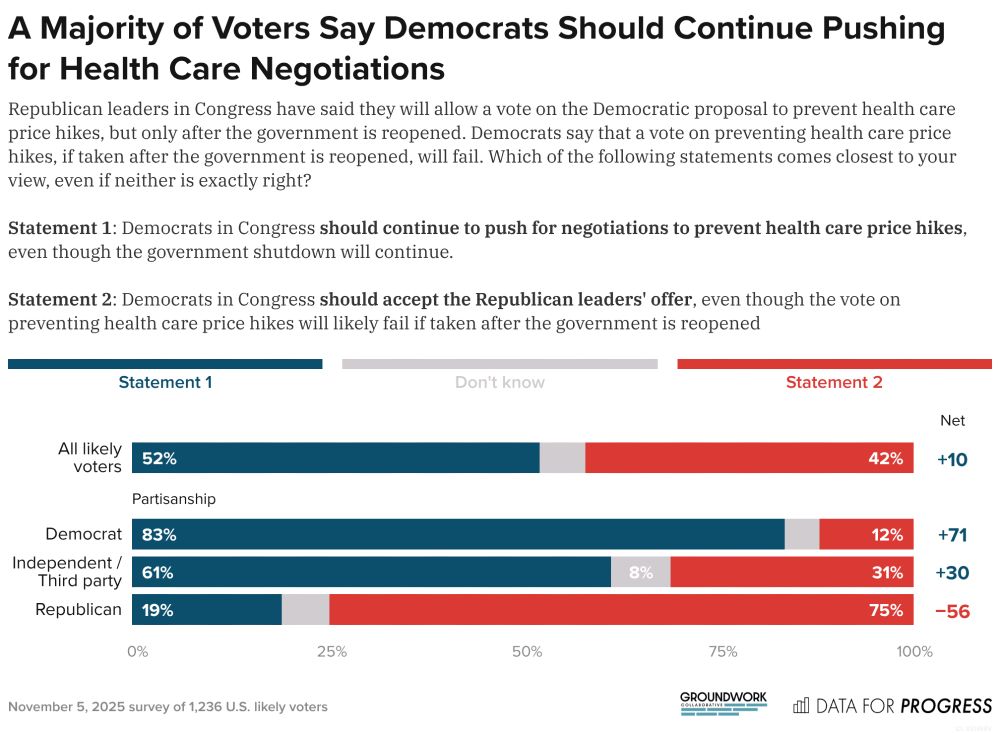
Voters trust the Democratic Party (51%) more than the Republican Party (43%) to handle SNAP.
www.dataforprogress.org/blog/2025/11...

Voters trust the Democratic Party (51%) more than the Republican Party (43%) to handle SNAP.
www.dataforprogress.org/blog/2025/11...
Voters everywhere respond when a candidate connects economic populism to clear, actionable goals.
Zohran Mamdani's policies are key examples — and they have popular appeal nationwide.
www.dataforprogress.org/insights/202...

Voters everywhere respond when a candidate connects economic populism to clear, actionable goals.
Zohran Mamdani's policies are key examples — and they have popular appeal nationwide.
www.dataforprogress.org/insights/202...

Voters everywhere respond when a candidate connects economic populism to clear, actionable goals.
Zohran Mamdani's policies are key examples — and they have popular appeal nationwide.
www.dataforprogress.org/insights/202...
We find that Mary Peltola leads Sen. Sullivan by one point in a hypothetical Senate race.
If she were to run for governor, we find Peltola in a commanding lead, leading the next Republican candidate by 31 points in the first round of ranked choice voting.

We find that Mary Peltola leads Sen. Sullivan by one point in a hypothetical Senate race.
If she were to run for governor, we find Peltola in a commanding lead, leading the next Republican candidate by 31 points in the first round of ranked choice voting.
But voters like renewable energy, view wind and solar as the cheapest forms of energy, and don't blame renewables for high prices.
That gives Democrats the high ground to go on offense on energy prices.
Read our new DFP Insight: ⤵️
![Bar chart of polling data from Data For Progress.
Title: Voters Most Blame Utility Companies for Higher Electric Utility Bills.
Description: Who or what do you think is most responsible for higher electric utility bills?
Utility companies increasing profits — 38%
Increased energy demand from new industries (like AI) — 14%
Extreme weather events causing higher energy demand — 11%
Aging or inadequate energy infrastructure — 10%
Foreign conflicts limiting energy supply — 9%
Increased reliance on fossil fuels — 8%
Increased reliance on wind and solar energy — 5%
Something else [please specify] — 5%
September 19–22, 2025 survey of 1,361 U.S. likely voters.](https://cdn.bsky.app/img/feed_thumbnail/plain/did:plc:ltzetlayeqsp4qu7pb4irz24/bafkreicouunabznliggsr54sfsz7tvrxmqpbjtbej3fh6ro7qdezs76jlm@jpeg)
But voters like renewable energy, view wind and solar as the cheapest forms of energy, and don't blame renewables for high prices.
That gives Democrats the high ground to go on offense on energy prices.
Read our new DFP Insight: ⤵️
The point of our research is not to determine what our values should be, but how to fight for our values most effectively.
Excited to keep working with our amazing, dedicated team to sharpen our strategy.
Ryan is an expert in survey methodology with a long history in progressive and union politics — he has worked with DFP since 2019 to shape our electoral polling.
The point of our research is not to determine what our values should be, but how to fight for our values most effectively.
Excited to keep working with our amazing, dedicated team to sharpen our strategy.

